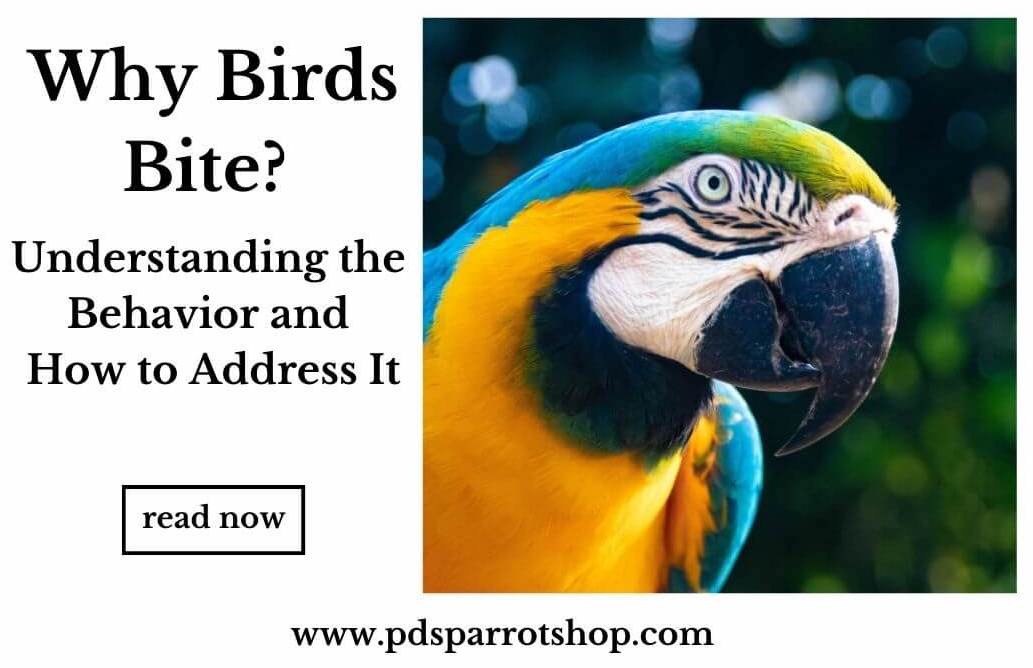
Why Birds Bite: Understanding the Behavior and How to Address It
Share
Welcome to the intriguing world of avian behavior! If you're wondering "why birds bite," you're not alone. This comprehensive article delves into the various factors contributing to this behavior, offering valuable insights and practical tips for bird owners and enthusiasts.

Pin Me!
The Nature of Instinctual Behavior
Understanding why birds bite starts with acknowledging their instinctual nature. Birds, with their beaks as primary tools, use biting as a means of communication, protection, or expressing discomfort. Delve into the world of avian instincts to decipher the motives behind this behavior.
Environmental Triggers
Explore the environmental triggers that can lead to biting tendencies in birds. Changes in surroundings, noise levels, or the introduction of new elements can cause stress, prompting birds to resort to biting. Learn how to create a bird-friendly environment to minimize these triggers.
Social Dynamics Among Birds
Birds, much like humans, have intricate social structures. Explore how social dynamics, including hierarchy and territorial instincts, can influence biting behavior. Gain insights into fostering positive interactions between birds to reduce instances of aggression.
Health-Related Causes
A bird's health plays a crucial role in its behavior. Investigate common health issues that may lead to biting, such as pain, hormonal changes, or nutritional deficiencies. Discover proactive measures to ensure your feathered companions enjoy optimal health.
Birds may bite for various reasons, and understanding their behavior can help prevent such incidents. Here are some common reasons why a bird might bite:
-
Territorial Behavior: Birds can be territorial, especially during breeding seasons. If a bird perceives you as a threat to its territory or nest, it may bite to defend itself.
-
Fear or Stress: Birds may bite when they feel scared or stressed. Approaching a bird too quickly or making sudden movements can trigger fear responses, leading to defensive biting.
-
Protecting Their Young: Parent birds may become aggressive when they feel their chicks are in danger. If you come too close to a nest or their offspring, they may bite to protect their young.
-
Handling Issues: Some birds may bite if they are uncomfortable with being handled. This can be due to lack of socialization, past negative experiences, or simply individual personality traits.
-
Illness or Pain: Sick or injured birds may bite as a defensive response. Pain or discomfort can make them more irritable, leading to defensive behavior.
-
Hormonal Changes: During hormonal periods, such as breeding seasons, some birds may exhibit more aggressive behavior. This is common in species where hormonal changes influence their territorial and mating instincts.
-
Misinterpretation of Intentions: Birds may bite if they misinterpret your actions. For example, reaching towards them abruptly might be seen as a threat, leading to a defensive bite.
-
Lack of Trust: Building trust with a bird takes time. If a bird doesn't trust you or hasn't been properly socialized, it may resort to biting as a way of expressing discomfort or fear.
-
Social Hierarchy: In multi-bird households, there may be instances of dominance-related biting as birds establish or maintain their social hierarchy.
-
Teething (in young birds): Just like puppies, young birds may go through a teething phase where they nibble or bite to alleviate discomfort from growing beaks.
Strategies for Managing Biting Behavior
Positive Reinforcement Techniques
Effective training is essential in managing biting behavior. Explore positive reinforcement techniques that promote desirable behavior in birds. From treats to verbal cues, discover methods that strengthen the bond between you and your feathered friends.
Giving time out for a few minutes is a way to teach what behaviors are not acceptable however, consistently is key. You must remain consistent with positive reinforcements/time outs/ or another technique every time. Parrots are highly intelligent with the ability to perceive emotion, body language, and tone, so they will understand when you are sad, because of the bite.
Creating Safe Spaces
Birds appreciate having their designated safe spaces. Learn how to set up secure areas where birds can retreat when feeling stressed or threatened. This simple yet effective strategy can significantly reduce biting incidents.
Providing Mental Stimulation
Boredom can contribute to biting behavior. Uncover ways to stimulate your bird's mind through toys, puzzles, and interactive activities. A mentally engaged bird is less likely to resort to biting as a form of entertainment.
Understanding why birds bite is a crucial aspect of responsible bird ownership. By exploring the various factors contributing to this behavior and implementing positive reinforcement techniques, you can foster a harmonious relationship with your parrot.
It's essential to approach and handle birds with care, respecting their natural instincts and personal space. Gradual socialization, positive reinforcement, and understanding their cues can help prevent biting incidents and foster a trusting relationship with your feathered friend.
FAQs about Bird Biting
Can all birds be trained to stop biting?
Absolutely! While individual differences exist, proper training techniques can significantly reduce biting behavior in most birds. Consistency and patience are key.
Is biting more common in certain bird species?
Certain species may have a predisposition to biting, but individual temperament and upbringing play crucial roles. With proper care and attention, biting tendencies can be addressed in any bird.
How do I identify the reason behind my bird's biting?
Observation is key. Monitor your bird's behavior, noting any patterns or changes. Consulting with a vet can also help rule out potential health-related causes.
Should I punish my bird for biting?
Giving a few minutes of time out is a great way to tell a parrot what behavior is not acceptable. But you must be consistent. Or focus on positive reinforcement: Rewarding good behavior and ignoring the bad.
Can biting be a sign of sickness?
Yes, it can. Regular veterinary check-ups are essential to rule out any underlying health issues causing discomfort and, subsequently, biting.
Are there professional trainers for bird behavior?
Indeed, there are professionals specializing in bird behavior. Seeking their guidance can be beneficial in addressing and correcting biting habits.
More Articles on Bird Health
Toxic Respiration Hazards for Pet Birds
Will apple seeds kill my birds
How to keep your pet bird clean
Author: Monika Sangar
Co-founder of Prego Dalliance Sanctuary, Artisan of PDS Parrot Shop
Monika Sangar, the co-founder of Prego Dalliance Sanctuary, a 501c3 non-profit organization, uses these blogs to share her hands-on experience with parrots.
She is a designer and artisan at PDS Parrot Shop, and her craft can be viewed below. (click on logo)
PDS is a registered 501(c)3 nonprofit organization (tax id #46-2470926) PDS parrot shop makes parrot toys to help fund our sanctuary, Prego Dalliance sanctuary, 501c3, non-profit. www.pdsnonprofit.org

